.jpg?cx=1265&cy=0&cw=468&ch=625)
Making The Right Choice: Heat Pump Water Heater vs Tankless?
Table of Contents
- What Are They?
- How Do These Water Heaters Work?
- What Are the Differences Between Heat Pump & Tankless Water Heaters?
- Pros of Heat Pump Water Heaters
- Pros of Tankless Water Heaters
- Is a Tankless Water Heater or Heat Pump Water Heater Right for Me?
- Want to Upgrade Your Water Heater?
- Problems With Your Water Heater?
- Learn More About Tankless Water Heaters
Tankless and heat pump water heaters are two great alternatives for efficient, effective water heating. While vastly different, they reduce water heating costs while ensuring you always have hot water on tap. The guide explains how heat pump water heaters vs. tankless heaters work and why you should consider installing one for your next water heater.
What Are They?
A heat pump water heater is a version of the water heater that transfers heat from the air to the water in the tank using the refrigeration cycle, while a tankless water heater has a burner or electric elements that heats water as it's required.

Heat Pump Water Heaters
An electric heat pump water heater is often called a hybrid heater because it will transfer heat from the air and can use backup heating elements to heat the water. A heat pump is an air conditioner working in reverse. It transfers heat energy from the air into the water tank.
A heat pump is very efficient, using around a quarter of the energy needed to heat the water compared to a conventional tank water heater. Hybrid water heaters work in low ambient temperatures and have electric heating elements for supplementary water heating in colder weather or periods of high demand.
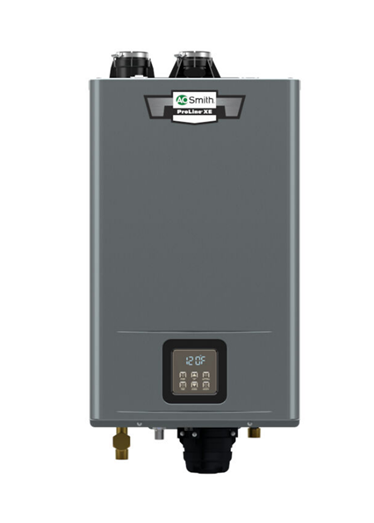
Tankless Water Heaters
Tankless water heaters supply hot water as needed. Heating is instantaneous, and a tankless water heater provides an unending supply of hot water when sized appropriately. They're compact, and you can install them in any convenient location, such as in an empty closet, under the counter, or on an exterior wall. They don't have a hot water storage tank and are more efficient than standard water tank heaters. You can use tankless water heaters to supply hot water to a single faucet or to provide hot water for an entire home.
How Do These Water Heaters Work?
When comparing heat pump water heaters vs. tankless water heaters, it's useful to understand how they work, as these differences can have an impact on how you use the water heaters.
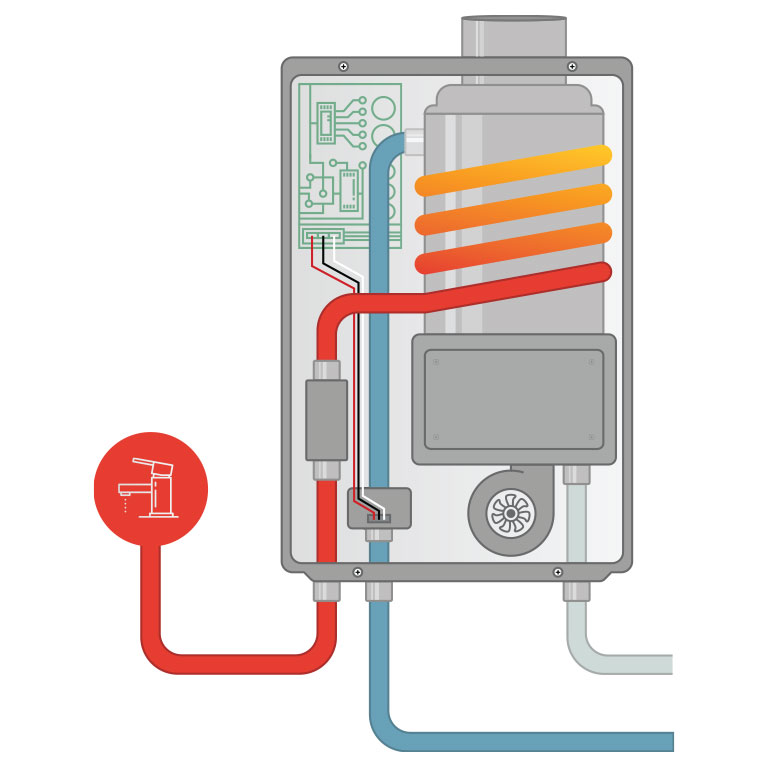
How Does a Heat Pump Water Heater Work?
A heat pump water heater works by extracting heat from the surrounding air and transferring it to the water. It does this by compressing a refrigerant gas to a high temperature, high pressure vapor and condensing the vapor in a condenser that wraps around the tank. This process heats the water in the tank. The now-cold liquid refrigerant moves to an evaporator coil on top of the unit, and boils off to a vapor, absorbing heat from the surrounding air and repeating the process.
How Does a Tankless Water Heater Work?
A tankless water heater heats water on demand by passing the water through a heat exchanger heated by electric elements or a gas burner. A thermostat controls the water temperature to prevent scalds or burns. Tankless heaters come in varying flow rates from 0.2 to 7.49 gallons per minute of hot water. At higher flow rates, tankless water heaters use large gas burners or multiple electric elements to supply sufficient heat to heat the water as it passes through the water heater.
What Are the Differences Between Heat Pump & Tankless Water Heaters?
There are several notable differences between these two types of hot water heaters. These include the heating mechanism, maintenance requirements, energy efficiency and cost.

How They Heat Up
These two methods of water heating work quite differently. The heat pump uses indirect heating involving a heat exchanger, while the tankless heater uses direct gas or electric heating. A heat pump water heater is up to four times more efficient than a tankless heater.
Heat Pump Water Heater
A heat pump water heater transfers heat from the ambient air into the water. The process draws heat energy from the air to heat the water in the water tank. The only external energy needed is the amount of electricity used by the compressor, fan, and metering device which is typically a fraction of the total amount of heat transferred.
Tankless Water Heater
Tankless water heaters heat water directly as it flows through the unit. They use high BTU gas burners or electrical heating to raise the water temperature from ambient to its set point in the time it takes for the water to flow through the heater. Because the water is heated as it's used, tankless water heaters don't experience the same heat losses as conventional hot water tanks.
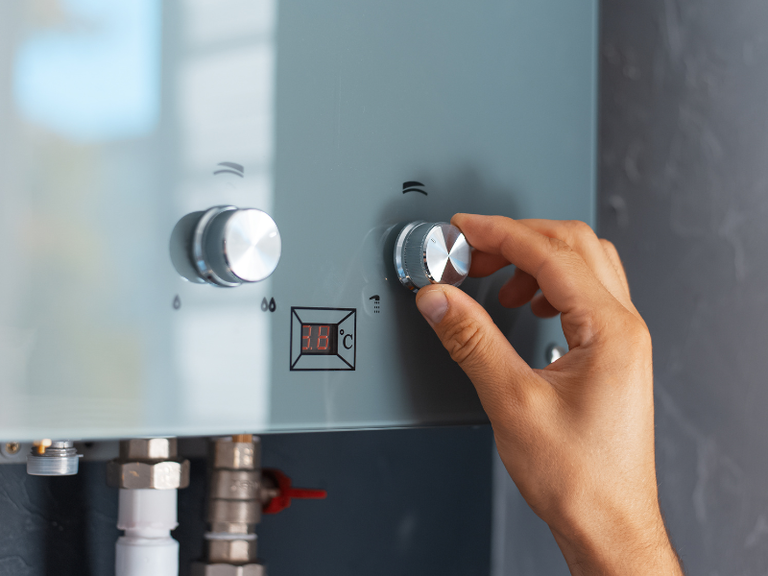
Maintenance Requirements
Both forms of water heating units require periodic maintenance. Proper maintenance ensures smooth operation and helps promote a longer service life.
Heat Pump Water Heater Maintenance
Water contains dissolved minerals that leach out when heated. These form sediment that should be flushed out once or twice a year. The water tank has a protective anode that prevents tank corrosion, and this should be inspected annually and replaced when necessary. You must also clean the air filter on the heat pump when the control assembly detects it's blocked or every six months and periodically clean the condensate drain. We recommend contacting a plumbing contractor for assistance.
Tankless Water Heater Maintenance
Most tankless water heaters require maintenance. The main preventive action is to descale the heat exchanger from time to time to prevent material buildup and to clean the cold water inlet filter if equipped. You should have the air intake, condensate drain and gas venting system checked every year. We recommend contacting a plumbing contractor for assistance. To avoid having to descale each year, we recommend investing in one of our latest gas tankless water heaters with X3 Scale Reduction Technology. These units last three times longer compared to unprotected units.
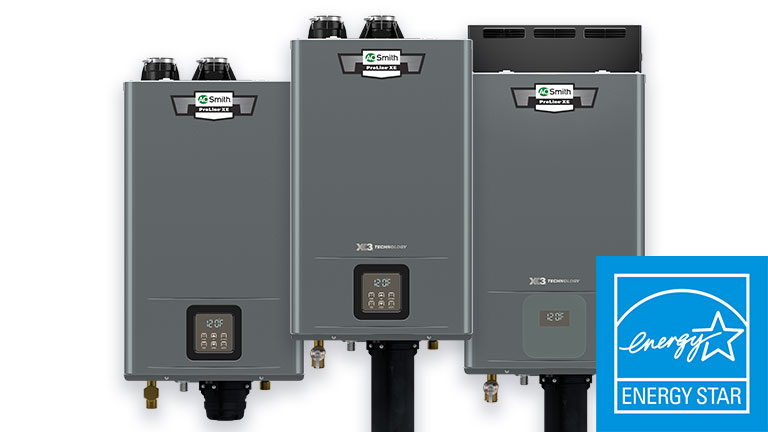
Energy Efficiency
Both types of water heaters use less energy than standard hot water tanks. Overall, heat pump water heaters are more energy efficient than other types of water heaters.
Heat Pump Water Heater Energy Efficiency
Because heat pumps move energy, they're extremely efficient. Instead of directly heating the water, they use environmental heat sources. Their primary energy usage is for the compressor. Heat pump water heaters are up to four times more efficient than a standard electric or tankless water heater, with many heat pump water heaters having a Uniform Energy Factor (UEF) of up to 3.88.
Tankless Water Heater Energy Efficiency
Tankless water heaters have a UEF of around 0.95, which is not significantly different from that of condensing tank water heaters. Where they differ is that they only draw power when heating water, and there's no water storage tank to maintain. This means you don't waste energy keeping water hot. Compared to water tanks, a tankless water heater can save up to 40% of energy compared to a standard hot water tank, depending on usage.
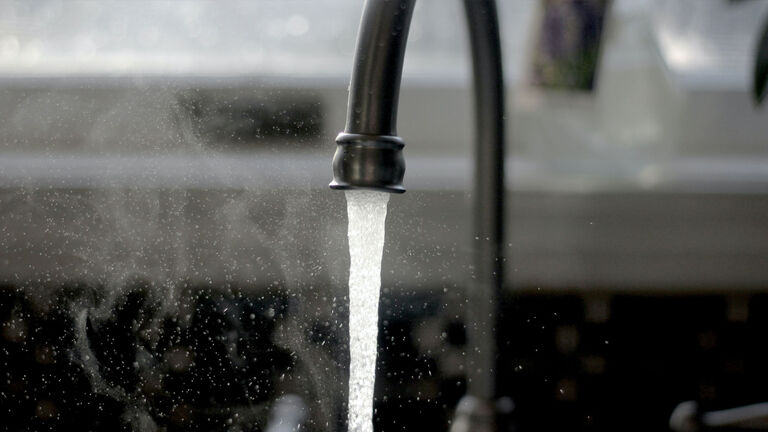
Cost Comparison Between a Heat Pump and a Tankless Water Heater
When comparing costs, it's important to total the upfront costs, including installation, together with the running and maintenance costs to work out a true cost over the lifetime of the water heater. This helps you make an informed comparison when considering vastly different types of water heating.
Heat Pump Water Heater Costs
A heat pump water heater can often have a high initial cost that could be up to three times the price of an equivalent water tank when you don’t include all the rebates & tax credits available throughout the U.S. ENERGY STAR certified with a UEF up to 3.88, you can offset the initial cost if you qualify for the federal 30% heat pump water heater Federal Tax Credit of up to $2,000. You may also be eligible for local utility rebates. Your yearly energy costs will also be around a quarter of those of a standard hot water tank and may save you up to $600 per year or $6,000 over 10 years, depending on where you live. This means you can recover the higher initial cost from the energy savings over time.
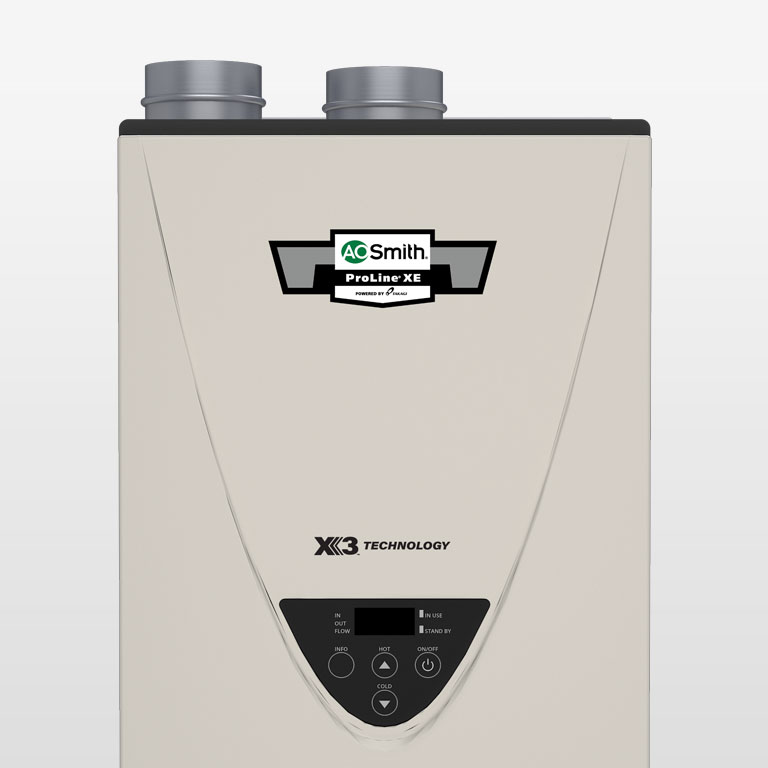
Tankless Water Heater Costs
Tankless water heaters are more moderately priced depending on features. Standard tankless electric water heaters cost around the same as those with tanks, but you should factor in the installation cost, which may be much higher. You will save on running costs compared to tank water heaters because you won't be paying for heat losses from the tank. High-efficiency gas condensing tankless water heaters cost more but achieve greater efficiencies and have lower running costs. You may also qualify for a Federal tax credit of up to $600 provided the natural gas water heater is ENERGY STAR certified with a UEF greater or equal to 0.95. As mentioned before, to avoid yearly maintenance of having to descale your unit each year, we recommend investing in one of our latest gas tankless water heaters with X3 Scale Reduction Technology. These units last three times longer compared to unprotected gas tankless units.
Pros of Heat Pump Water Heaters
Although smart hybrid electric heat pump water heaters cost more, there are several reasons to consider buying one instead of a tankless water heater. These include significantly improved energy efficiency, long-term cost savings and a positive impact on the environment.
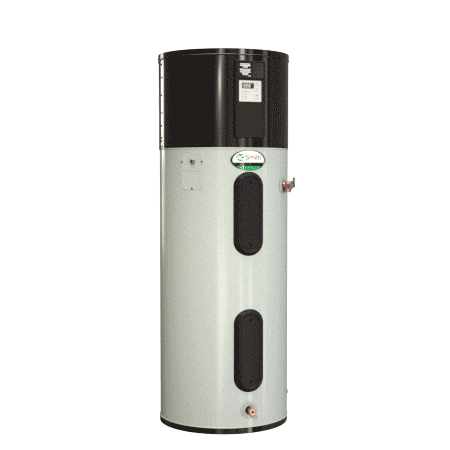
Energy Efficiency
Heat pumps are extremely energy-efficient. They transfer heat from the ambient air into the water, rather than by directly heating the water. Compared to a traditional electric water heater, operating costs are significantly lower. Additionally, heat pumps have auxiliary heating elements for times of high water demand or when the weather is unseasonably cold.
Cost Savings
Despite a potentially higher upfront cost without rebates & tax credits available throughout the U.S, installing a heat pump water heater can result in long-term cost savings due to its lower energy consumption. According to ENERGY STAR, a heat pump in a large household can save up to $550 each year compared to a standard tank, which more than covers the initial purchase and installation costs over 10 years.
Environmentally Friendly
Heat pumps are one of the most environmentally friendly methods of heating water. They use ambient heat sources rather than fossil fuels to heat the water. Their energy consumption is a fraction of that needed by standard tank or tankless water heaters. Compared to all other forms of hot water heating, heat pumps directly reduce greenhouse emissions.
Pros of Tankless Water Heaters
Here are some reasons professionals give for considering a tankless vs. a heat pump water heater for your home.
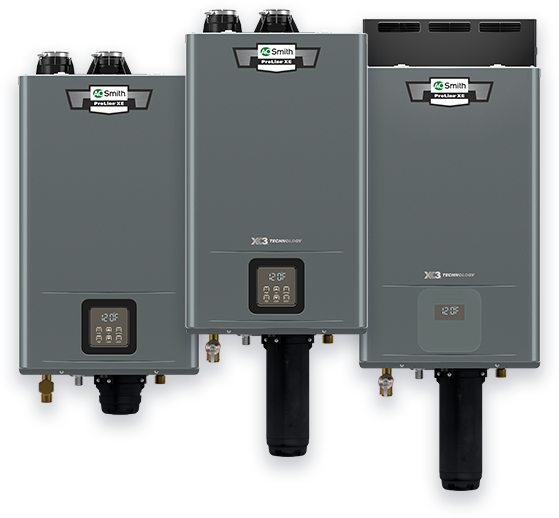
On-Demand Hot Water
A tankless water heater provides hot water on demand. There's very little waiting for the water to heat up; it warms up immediately. Unlike conventional water heaters, tankless water heaters never run out; they can supply hot water continuously when sized appropriately. With a tankless water heater, you don't need a hot water storage tank even for whole home hot water heating.
Space-Saving Design
Tankless water heaters take up less space than traditional tank heaters. You can install a tankless water heater almost anywhere there's space in a closet or cupboard or even attach one to an outside wall in warmer climates. Additionally, for whole-home water heating, it's simple to place the hot water heater in a central location.
Longer Lifespan
All things being equal, tankless water heaters have a longer lifespan than tank-style water heaters. Storage tank water heaters typically have a lifespan of up to 10 years, while tankless hot water heaters can last for up to 20 years.
Is a Tankless Water Heater or Heat Pump Water Heater Right for Me?
This review of tankless vs. heat pump water heaters has highlighted the strengths, features, and differences of these two ways of heating domestic water. Both water heaters have excellent selling points, but only one will be right for you.
Why Should You Choose a Tankless Water Heater?
A tankless water heater provides a continuous supply of on-demand hot water. It's an efficient, cost-effective solution to your home's hot water needs that takes up little space.
Why Should You Choose a Heat Pump Water Heater?
If you want to save on energy costs, a heat pump water heater is a smart choice. By harnessing the energy in the ambient air instead of using gas or heating elements, you're also contributing to environmental sustainability.
Want to Upgrade Your Water Heater?
Is your hot water supply insufficient? Perhaps it's not providing sufficient hot water for your growing family or it's simply old and inefficient. If the water heater no longer meets your needs, it's time for a new one. Contact your nearest A.O. Smith water heater installer to discover how a new water heater can save you money. Choose between energy-efficient heat pumps, standard storage tanks or on-demand tankless water heaters.
Problems With Your Water Heater?
When did you last have the water heater serviced? All water heaters require some maintenance. Tank water heaters should be flushed at least annually and anode rods replaced as needed. Tankless water heater filters require cleaning and descaling unless you have one of our latest gas tankless water heaters with X3 Scale Reduction Technology, while the burners on gas-fired water heaters should be regularly cleaned and serviced. If the water heater is not working properly, contact a plumbing contractor. They will check it out and repair and service the unit as needed.
Learn More About Tankless Water Heaters
The demand for tankless water heaters is estimated to grow at an annual rate of 7.45%. Reasons for this include low cost, convenience and an endless supply of hot water when appropriately sized. There are two types of tankless water heaters: gas-fired and electric.
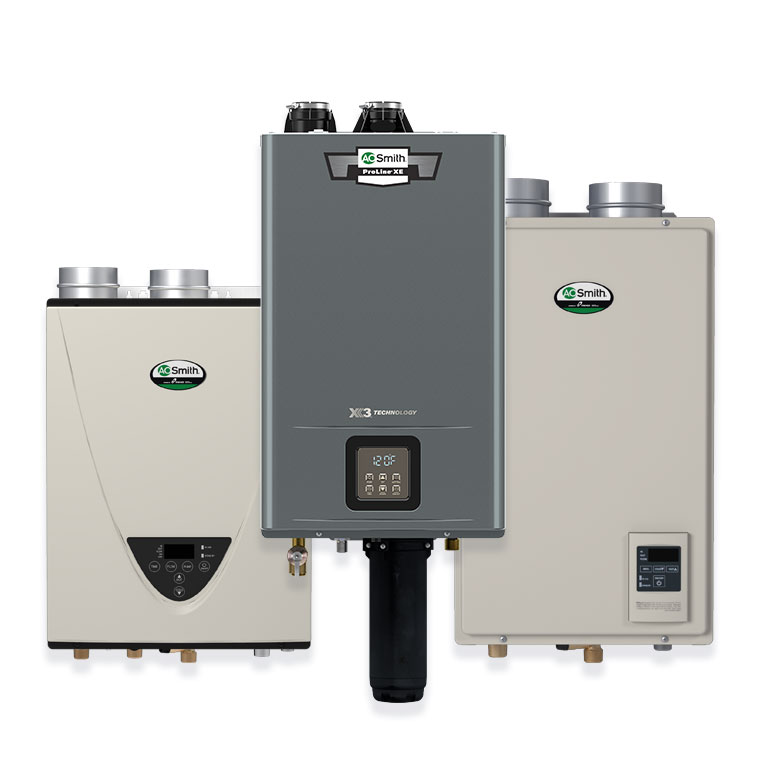
Gas Tankless
These units use natural gas or liquid propane and have capacities from 2.5 to 7.49 gallons per minute. You can choose between non-condensing and condensing models. Non-condensing gas tankless water heaters are cheaper, but condensing types are more efficient. Many units come with a 15-year warranty, which is a testament to their longevity.
Electric Tankless
Electric tankless water heaters have capabilities similar to gas tankless water heaters, but they don't need a gas or liquid propane supply. You can connect them to the electrical service box. Make sure your electrical box has sufficient capacity for larger electric tankless water heaters. Models range from 1.75 kW single point-of-use units up to powerful 32 kW 4-chamber types. These larger units have a flow capacity of up to 3.6 gallons per minute when heating cold water by 60 degrees Fahrenheit. Electric tankless water heaters have a soft-start controller to prevent lights from dimming during startup.